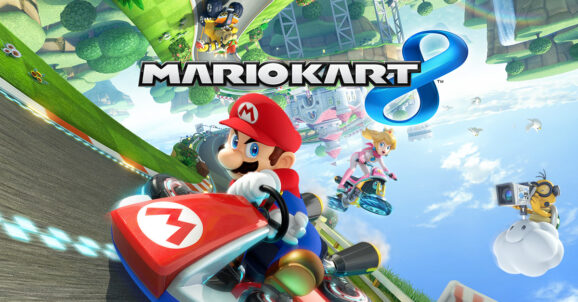Mario Kart Makes You Happy — Science Says So
This article is more than 2 years old
 When I was little, I begged my parents for a Nintendo. No dice. About a week ahead of my ninth birthday, I asked them for only one thing — permission to spend my own money, hard-earned from lawn mowing, leaf raking, and other chores, on a Nintendo. Still no. My parents said they didn’t want me getting up at 3 am to play video games, that they knew me well enough to know I’d become obsessed with a Nintendo if we had one. I was furious, but in retrospect, they were completely right. Back then I compensated by playing games at friends’ houses or riding my bike up to the Pizza Hut that had an arcade version of Super Mario Bros. I do the same thing now, though to a lesser extent. The game I get most excited to play as an adult is Mario Kart, which I’ve been playing on other people’s systems since college. I now live with someone who owns a Wii (don’t tell my parents!) and a few months ago we got Mario Kart 8, which has improved on old versions by allowing players to ride on walls and ceilings, to fly, and to get speed boosts by crashing into others. Even though I may play too much these days, I’m heartened by knowing that good ol’ science has demonstrated that playing Mario Kart actually makes people happier.
When I was little, I begged my parents for a Nintendo. No dice. About a week ahead of my ninth birthday, I asked them for only one thing — permission to spend my own money, hard-earned from lawn mowing, leaf raking, and other chores, on a Nintendo. Still no. My parents said they didn’t want me getting up at 3 am to play video games, that they knew me well enough to know I’d become obsessed with a Nintendo if we had one. I was furious, but in retrospect, they were completely right. Back then I compensated by playing games at friends’ houses or riding my bike up to the Pizza Hut that had an arcade version of Super Mario Bros. I do the same thing now, though to a lesser extent. The game I get most excited to play as an adult is Mario Kart, which I’ve been playing on other people’s systems since college. I now live with someone who owns a Wii (don’t tell my parents!) and a few months ago we got Mario Kart 8, which has improved on old versions by allowing players to ride on walls and ceilings, to fly, and to get speed boosts by crashing into others. Even though I may play too much these days, I’m heartened by knowing that good ol’ science has demonstrated that playing Mario Kart actually makes people happier.
Sure, people might experience a boost when defeating opponents in the game, or when nailing Peach with a red shell. But why? And how long does that euphoria last? Researchers recently published a study in Computers in Human Behaviour called “The winner takes it all: The effect of in-game success and need satisfaction on mood repair and enjoyment.” The study argues that playing video games is a positive social experience and can help diminish real-life stress and anxiety, especially when a player is kicking ass. The results of the study are consistent with an earlier study that showed even violent video games can have a calming effect on kids.
Here’s how they did the study. They made a bunch of subjects undertake a frustrating math task (in case you’re curious, they administered something called a paced auditory serial-addition task, or PASAT, which was originally developed to diagnose brain damage and involves listening to a recording spit out number after number, and the subject having to add them all in his head). So they got the subjects good and irritated, as evidenced by a mood questionnaire, and then had them play two rounds of Mario Kart. Of course, all the participants felt happier after playing the game, but isn’t that like saying I felt happier eating ice cream than I did when scrubbing the kitchen floor?
Apparently, it’s not just the comparison between the two activities that accounts for the boost in happiness. Participants reported “need satisfaction,” which here was tied to competence and autonomy. I find that particularly interesting — it suggests that something like Mario Kart might be more enjoyable than playing a board game with other people, which raises other concerns about gaming, but also distinguishes it from, say, web surfing.
The study also indicated that the participants’ success at the game determined whether playing ameliorated the stress caused by the PASAT. So while everyone enjoyed their rounds of Mario Kart, actual “mood repair” was tied to the players’ ranking. Interestingly, these were all one-player races, rather than the two, three, or four-player versions the game allows. It’s unclear how playing with multiple players would affect the sense of autonomy, and whether a sense of “relatedness” to other players would boost the enjoyment or mitigate it, especially if you’re playing with someone better than you.
Regardless, a mood boost is a good thing given that Mario Kart 8 has just sold over one million units in the U.S., making it second in sales only to Super Mario Bros U. In fact, game sales have surged so much in the past six months that Nintendo just announced it will be making games for the iPad (seriously, I wish I didn’t know that).












